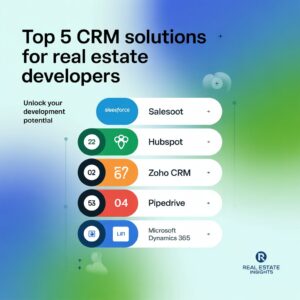In the fast-paced world of real estate development, managing leads, nurturing client relationships, and closing deals efficiently can make or break a business. This is where a Customer Relationship Management (CRM) system for real estate developers becomes indispensable. A well-implemented CRM helps developers organize contacts, automate follow-ups, track sales pipelines, and improve marketing strategies—all while saving time and increasing revenue.
If you’re a real estate developer looking to enhance lead conversion, improve client retention, and scale your business, this comprehensive guide will walk you through everything you need to know about choosing and using the best CRM for your needs.
Why Real Estate Developers Need a CRM
Real estate development is a high-stakes industry where relationships, timing, and data management play crucial roles. Without a centralized system, important leads can slip through the cracks, communication can become chaotic, and sales opportunities may be missed.
Here’s why a real estate CRM is essential:
1. Centralized Lead Management for Maximum Conversions
A CRM consolidates leads from various sources—website inquiries, social media, referrals, and open houses—into a single platform. Instead of juggling spreadsheets and sticky notes, your team can track every interaction, assign leads to agents, and prioritize high-value prospects.
2. Automated Follow-Ups to Keep Clients Engaged
In real estate, timing is everything. A CRM automates follow-up emails, reminders, and notifications, ensuring no lead goes cold. Whether it’s a new inquiry, a follow-up after a property tour, or a contract renewal, automation keeps your team responsive and professional.
3. Streamlined Sales Pipeline for Better Deal Tracking
A visual sales pipeline helps developers monitor deals at every stage—from initial contact to closing. By identifying bottlenecks, teams can focus on nurturing leads that are most likely to convert, improving efficiency and revenue.
4. Personalized Marketing Campaigns for Higher Engagement
Generic marketing doesn’t work in real estate. A CRM allows segmentation based on client preferences, location, budget, and past interactions. This enables targeted email campaigns, tailored property recommendations, and dynamic ads, increasing engagement and conversions.
5. Data-Driven Decision Making with Advanced Analytics
A CRM provides real-time insights into sales performance, lead sources, and agent productivity. Developers can use these analytics to refine strategies, forecast revenue, and allocate resources more effectively.
Key Features to Look for in a Real Estate CRM
Not all CRMs are created equal. To get the most out of your investment, look for these must-have features:
1. Contact & Lead Management
- Store detailed client profiles (contact info, preferences, interaction history).
- Assign leads to agents based on expertise or location.
- Track lead sources to identify the most profitable marketing channels.
2. Automation & Workflow Tools
- Automate follow-up emails, SMS reminders, and task assignments.
- Set triggers for actions like sending brochures after a site visit.
3. Integration with Real Estate Tools
- Sync with MLS listings, property portals (Zillow, Realtor.com), and email marketing tools (Mailchimp, HubSpot).
- Connect with accounting software (QuickBooks) and project management tools (Asana, Trello).
4. Mobile Accessibility
- Access client data, update deals, and communicate on the go via iOS/Android apps.
- Receive instant notifications for new leads or urgent tasks.
5. Customizable Dashboards & Reporting
- Track KPIs like lead conversion rates, average deal time, and agent performance.
- Generate reports for stakeholders to assess business growth.
6. Document Management & E-Signatures
- Store contracts, proposals, and legal documents securely.
- Enable e-signatures for faster deal closures.
Top 5 CRM Solutions for Real Estate Developers
Here are the best CRM platforms tailored for real estate developers:
1. Salesforce Real Estate CRM
- Best for: Large developers needing AI-driven insights.
- Key Features: Highly customizable, AI-powered analytics, seamless integrations.
- Pricing: Starts at $25/user/month (Salesforce Lightning).
2. HubSpot CRM
- Best for: Small to mid-sized developers wanting a free, user-friendly option.
- Key Features: Free plan available, excellent email marketing, easy automation.
- Pricing: Free basic plan; paid plans start at $20/month.
3. Zoho CRM
- Best for: Budget-conscious developers needing automation.
- Key Features: Affordable, strong workflow automation, good for small teams.
- Pricing: Starts at $14/user/month.
4. Pipedrive
- Best for: Sales-focused teams needing pipeline clarity.
- Key Features: Intuitive deal tracking, visual sales pipeline, great for agents.
- Pricing: Starts at $14.90/user/month.
5. Follow Up Boss
- Best for: Real estate teams prioritizing lead response.
- Key Features: Built for real estate, instant lead alerts, team collaboration.
- Pricing: Starts at $69/user/month.

How to Choose the Best CRM for Your Real Estate Business
Selecting the right CRM depends on your business size, budget, and specific needs. Follow these steps:
1. Define Your Goals
- Do you need lead tracking, automation, or marketing tools?
- Are you scaling quickly and need a cloud-based solution?
2. Check Integration Capabilities
- Ensure the CRM works with your existing tools (email, MLS, accounting software).
3. Test User-Friendliness
- A complicated CRM leads to low adoption. Opt for an intuitive interface.
4. Compare Pricing & Scalability
- Start with affordable options (HubSpot, Zoho) if you’re a small developer.
- Larger firms may need advanced features (Salesforce, Follow Up Boss).
5. Look for Customer Support & Training
- Choose a CRM with good customer service, tutorials, and onboarding support.
Best Practices for Using a CRM in Real Estate Development
Once you’ve chosen a CRM, maximize its potential with these tips:
Regularly Update Client Data – Keep records accurate for better personalization.
Train Your Team – Ensure everyone uses the CRM consistently.
Leverage Automation – Set up automated follow-ups and task reminders.
Analyze Reports – Use data to refine sales and marketing strategies.
Conclusion: Transform Your Real Estate Business with the Right CRM
A CRM for real estate developers is a game-changer—helping you manage leads, automate tasks, improve client relationships, and close more deals efficiently. Whether you’re a small developer or a large firm, investing in the right CRM will boost productivity, increase sales, and drive long-term growth.
Ready to take your real estate business to the next level? Explore the top CRM options today and start streamlining your operations!



Leave a Comment